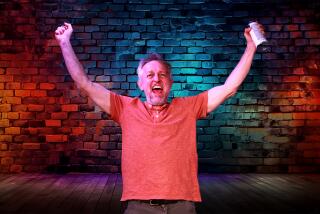In ‘Barley’ grows the cost of the Irish cause
- Share via
FOR director Ken Loach, the personal is always political, the political personal. The dean of British independent filmmakers, Loach has the gift of finding the intensely moving private emotions in broad, societal dilemmas. He does that with his fine new film, “The Wind That Shakes the Barley,” and he does a few new things as well.
“Barley” is the only one of Loach’s works to receive Cannes’ prestigious Palme d’Or. It is also one of the first to utilize a recognizable international star: Cillian Murphy, memorable as the evil Scarecrow in “Batman Begins.” And it is only the second of Loach’s 19 films (after “Land and Freedom”) to be set in a politically charged past rather than a socially committed present.
Named after a poem that favored Irish independence from Britain, “Barley” takes place in Ireland in the early 1920s, a time that remains so controversial that some British newspapers savagely attacked Loach’s film, even going so far as to compare the director to Third Reich glorifier Leni Riefenstahl.
But “Barley” starts quietly, with an afternoon game of hurling on land near Cork belonging to Sinead (Orla Fitzgerald) and her family. Among the players are Damien (Murphy), set to begin a medical residency in London in a few days, and his brother Teddy (Padraic Delaney).
Suddenly, the afternoon explodes as a platoon of gun-toting Black and Tans appears. They’re thuggish British troops determined to humiliate and demean the Irish for daring to gather for any purpose at all. Things violently spiral out of control, as they do again when Damien attempts to take his train to London, and as a result the young man decides to stay and join the clandestine Irish Republican Army in its dedication to gaining Irish independence by any means necessary.
It is these sequences, as well as a brief but intense scene of British torture, that has led to the criticisms of “Barley.” Though Loach makes no apologies for either, the fact that stories of colonizers acting badly are not exactly new is something the film has to overcome.
But “The Wind That Shakes the Barley” turns out to be a more complicated, more dramatically potent story than it appears at first. It’s concerned at its core not with how bad the British were but with what the cost of dealing with them was for the Irish..
Damien, for instance, is as unabashedly pro-independence as anyone, someone who mockingly asks a British officer, “What should I do, turn the other cheek for the next 700 years?” But the boast of an Irish leader -- “If they bring their savagery over here, we will meet it with a savagery of our own” -- soon threatens to turn to ashes as people realize what they are being called on to do.
Murphy is especially good at playing the zealotry as well as the soul-searching and the regret, at showing us a man who is eaten up alive because he’s forced to act in ways that are contrary to his background and his training.
When he says, at one particularly potent junction, “I hope this Ireland we’re fighting for is worth it,” it’s an especially moving moment of doubt.
For once the Irish get a measure of success, their troubles do the opposite of going away. This is especially true after the truce of 1922, when the rebels face an agonizing choice: Do they accept partial independence as a British dominion along with the loss of Northern Ireland or do they continue to fight, likely hopelessly, for a complete independence that would lead to a more egalitarian society?
As written by Loach’s frequent collaborator Paul Laverty, the discussions around these points are compelling, and the air in the rooms is electric. Both sides have strongly thought-out points of view, the film tips its hand neither one way nor the other, and, given that the consequences of the actions taken have lasted until today, it’s all a rather thrilling situation.
“If a group is united against oppression, when the oppressor goes, all the splits and divisions emerge,” Loach explained at Cannes. “If you were alive at that time, it must have been an agonizing choice. There were no good people or bad people; all responses to the situation have a logic -- that’s the terrible dilemma.” And the source of wonderful drama as well.
*
“The Wind That Shakes the Barley.” MPAA rating: Unrated. Running time: 2 hours, 4 minutes. In selected theaters.
More to Read
Only good movies
Get the Indie Focus newsletter, Mark Olsen's weekly guide to the world of cinema.
You may occasionally receive promotional content from the Los Angeles Times.









